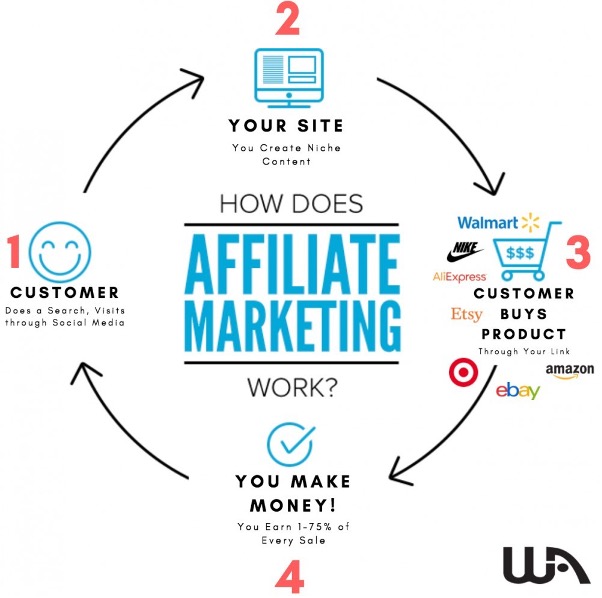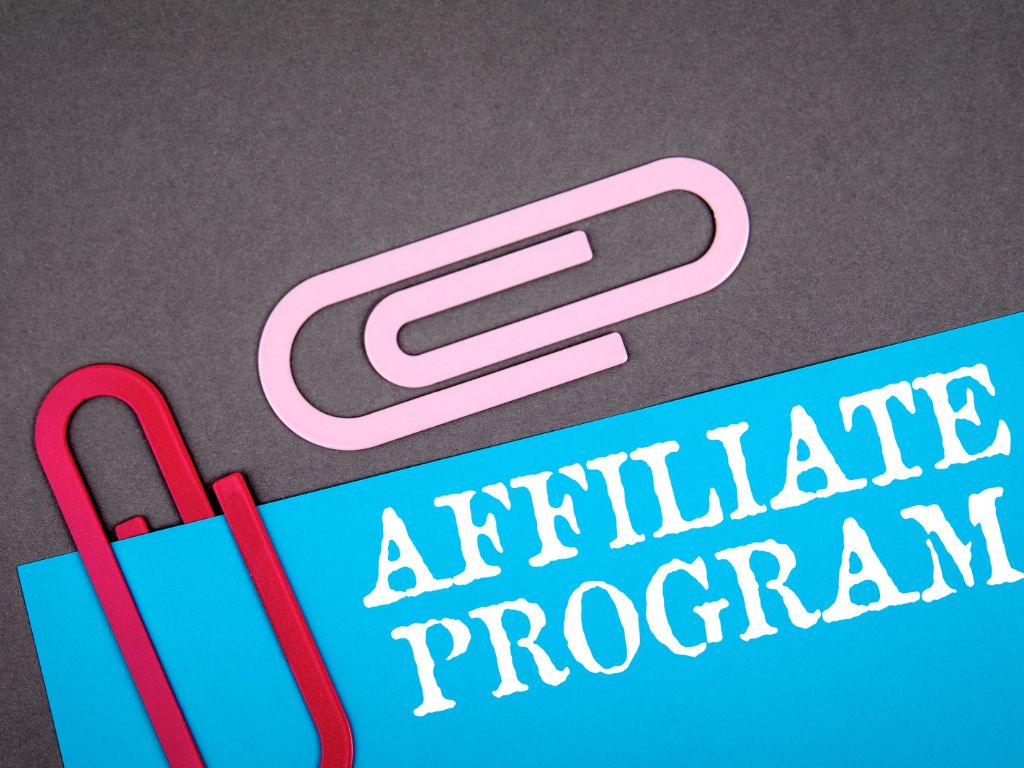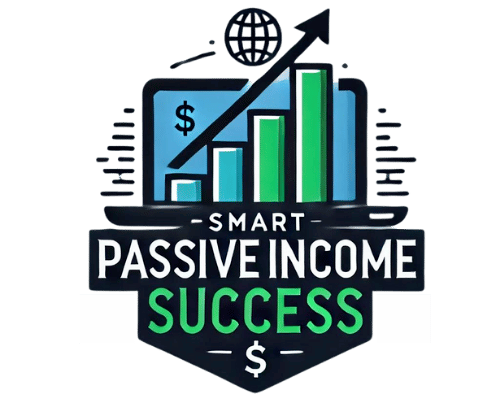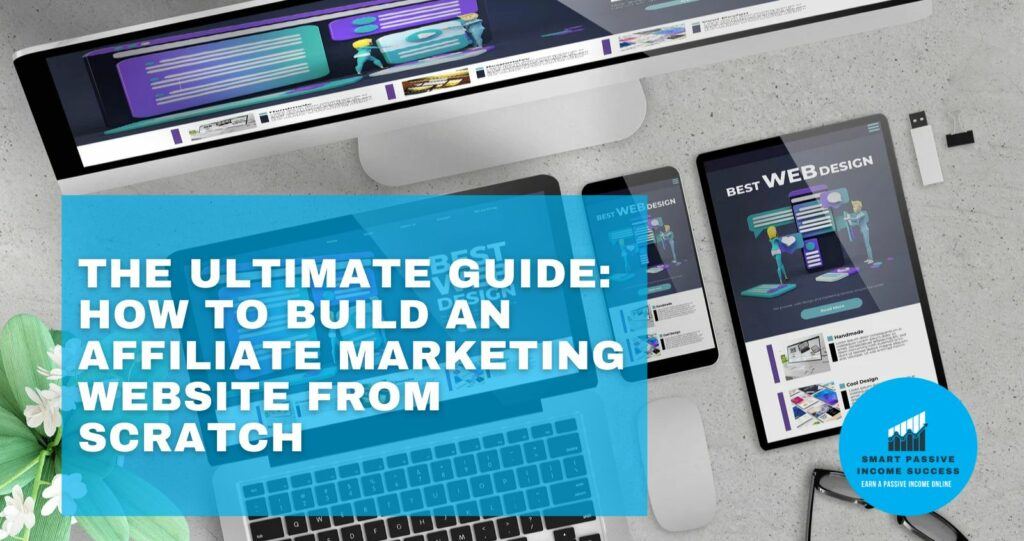Are you interested in starting an online business that allows you to earn passive income while promoting products and services you love? Look no further than affiliate marketing. With the right strategy, you can build a successful affiliate marketing website from scratch and start earning commissions in no time.
But where do you start? Building an affiliate marketing website can seem daunting, especially if you’re new to the online marketing world. That’s why we’ve created this ultimate guide to help you navigate the process step-by-step.
In this guide, we’ll cover everything you need to know to build a high-converting affiliate marketing website from scratch. From choosing the right niche and affiliate programs to building your website, creating high-quality content, and optimizing for conversions, we’ve got you covered. So, let’s dive in and get started on your journey to affiliate marketing success!
Disclosure: This post may contain affiliate links, which means we may receive a commission if you click a link and purchase something that we have recommended. While clicking these links won’t cost you any extra money, they will help us keep this site up and running. Thank you for your support!
Table of Contents
Chapter 1: Understanding Affiliate Marketing
Affiliate marketing is a popular online business model that allows you to earn a commission by promoting other people’s products or services. In essence, you act as a middleman between the product creator or seller and the consumer.
How Does Affiliate Marketing Work?
Here’s how affiliate marketing works:
You sign up for an affiliate program offered by a product creator or seller.
You receive a unique affiliate link that tracks clicks and sales made through your link.
You promote the product or service using various marketing channels, such as your website, social media, or email marketing.
When someone clicks on your affiliate link and makes a purchase, you earn a commission from the sale.

The commission rate varies depending on the product or service and the affiliate program, but it can range from a few per cent to 50% or more of the sale price.
One of the key advantages of affiliate marketing is that you don’t need to create your own product or service. Instead, you can leverage other people’s expertise and products to generate income.
Affiliate marketing is also a win-win situation for all parties involved. The product creator or seller gets more exposure and sales, the consumer gets a product or service they need, and you earn a commission for connecting the two.
Overall, affiliate marketing is a simple and effective way to start an online business and generate income. With the right strategies and tactics, you can build a successful affiliate marketing business and achieve financial freedom.
Why Affiliate Marketing is a Profitable Business Model
Affiliate marketing is a profitable business model for several reasons…
1. Low Start-Up Costs
Unlike traditional businesses that require significant investment in inventory, equipment, and employees, affiliate marketing can be started with minimal upfront costs. You don’t need to create or store products, and you can work from anywhere with an internet connection.
2. A Passive Income Potential
Affiliate marketing allows you to earn passive income by promoting other people’s products or services. Once you’ve set up your website and established an audience, you can continue earning commissions from affiliate sales without actively promoting products.
3. Access to a Wide Range of Products
As an affiliate marketer, you have access to a vast range of products and services that you can promote to your audience. This allows you to diversify your income streams and maximize your earning potential.
5. High Earning Potential
As an affiliate marketer, you have the flexibility to choose which products to promote and how to promote them. You can work on your own schedule and have control over your business without being tied to a specific location or boss
4. Flexibility & Autonomy
With the right strategies and tactics, affiliate marketing can be a highly profitable business model. As you build your audience and establish trust with them, you can earn higher commissions and potentially earn a full-time income from your affiliate marketing business.
Overall, affiliate marketing offers a low-risk, high-reward opportunity to earn passive income and build a successful online business.
Chapter 2: Finding Your Niche

Choosing a niche is a crucial step in starting an affiliate marketing business. A niche is a specific area of interest or expertise that you’ll focus on when creating content and promoting products. It’s important to choose a niche that you’re passionate about and that aligns with your interests, as this will make it easier for you to create high-quality content that resonates with your audience.
When selecting a niche, it’s also important to consider factors such as competition and potential profitability. You’ll want to choose a niche that has a reasonable level of competition, as this indicates that there’s demand for the products or services in that niche. At the same time, you don’t want to choose a niche that’s so competitive that it’s difficult to make a profit.
To identify a profitable niche, you can start by brainstorming areas of interest or expertise that you have. Consider niches that you’re passionate about, as well as those that have a broad enough audience to support an affiliate marketing business. You can also use tools such as Google Trends and keyword research tools (such as Jaaxy) to identify popular search terms and topics in your niche.
Once you’ve identified potential niches, it’s important to research the competition and potential profitability. Look at other websites and blogs in your niche to see what types of products and services they’re promoting, and how they’re monetizing their content. You can also use tools such as Google AdWords Keyword Planner to get an idea of the potential search volume and competition for keywords related to your niche.
By carefully selecting a niche and analyzing competition and potential profitability, you’ll be well on your way to building a successful affiliate marketing business that generates passive income through affiliate commissions.
If you’re still looking for inspiration or a niche for your affiliate marketing website, then here’s my complete guide on Finding Your Niche. Hopefully it helps you understand how to choose the right niche for you.
Chapter 3: Build An Affiliate Marketing Website

Building a website is a crucial step in creating a successful affiliate marketing business. Your website serves as the foundation for your online presence and provides a platform for promoting affiliate products. In this chapter, we will cover the key steps involved in building a website.
1. Selecting a domain name and hosting provider
The domain name is the web address of your website, and the hosting provider is the service that stores your website files and makes them accessible on the internet. It’s important to choose a domain name that is memorable, easy to spell, and relevant to your niche. You’ll also want to select a reliable hosting provider with a good reputation and fast loading speeds.
2. Setting up your website on a content management system (CMS) such as WordPress
A content management system (CMS) is a software application that allows you to create, manage, and publish content on your website without requiring coding skills. WordPress is a popular CMS that powers over 40% of all websites on the internet. It’s free, user-friendly, and customizable, making it an ideal choice for affiliate marketers.
3. Choosing and customizing a theme to match your niche and brand
The theme determines the look and feel of your website, including the layout, colours, fonts, and design elements. When selecting a theme, consider your niche and audience, and choose one that aligns with your brand image. You can also customize the theme to add your own branding elements, such as a logo or tagline.
4. Setting up essential pages such as the homepage, about us page, and contact page
Your website should have several essential pages that provide visitors with important information about your brand and products. The homepage is the first impression visitors will have of your website and should include a clear value proposition and call-to-action. The about us page should share your brand story and mission. The contact page should provide a way for visitors to get in touch with you, such as a contact form or email address.
By following these steps, you can create a professional-looking website that represents your brand and promotes your affiliate products effectively.
Why You Should Build Your Affiliate Marketing Website with Wealthy Affiliate...
Wealthy Affiliate is a popular online community that provides comprehensive training and support for aspiring affiliate marketers. By signing up for Wealthy Affiliate, you gain access to a wealth of resources that can help you build a successful affiliate marketing website from scratch.
One of the main benefits of Wealthy Affiliate is their comprehensive training program. They offer step-by-step tutorials and video lessons that cover everything from selecting a niche to driving traffic to your website. The training is designed for beginners and experts alike, so you can start learning even if you have no prior experience in affiliate marketing.
In addition to the training, Wealthy Affiliate also provides a suite of tools and features that can help you build and optimize your website. This includes a website builder, keyword research tool, and hosting service. Plus, you can access a supportive community of like-minded individuals who are also building their own affiliate marketing websites. You can ask for help, share your progress, and get feedback on your website to improve its performance.
Ready to Start Building your Own High-Converting Affiliate Marketing Website?
Chapter 4: Choosing Affiliate Programs

One of the key decisions you’ll need to make when starting an affiliate marketing business is which affiliate programs to join. There are thousands of affiliate programs out there, each with its own commission rates, terms, and requirements. Choosing the right programs is essential for your success as an affiliate marketer, as it will impact the types of products or services you promote, the commission rates you earn, and the overall profitability of your business.
In this chapter, we’ll explore strategies for identifying affiliate programs that align with your niche and audience, researching program terms and commission rates, and applying for and getting approved for affiliate programs.
1. Identify affiliate programs that align with your niche and audience
When choosing affiliate programs to join, it’s important to look for programs that align with your niche and are relevant to your audience. You want to promote products or services that your audience will be interested in and that will be a natural fit for your website or social media accounts.
2. Research affiliate program terms and commission rates
Before applying to join an affiliate program, take the time to research their terms and commission rates. Look for programs that offer competitive commission rates and have terms that are fair and reasonable. Some things to consider when researching affiliate programs include:
- Commission rates: How much commission will you earn for each sale or lead?
- Payment terms: When will you be paid and what payment methods are available?
- Cookie duration: How long does the affiliate program’s tracking cookie last?
- Conversion rates: What is the program’s average conversion rate?
- Product quality: What is the quality of the products or services being offered?
3. Apply and get approved for affiliate programs
Once you’ve identified affiliate programs that you’re interested in joining, the next step is to apply to become an affiliate. The application process will vary depending on the program, but in most cases, you’ll need to provide some basic information about yourself and your website or social media accounts. Some programs may also require you to have a certain amount of traffic or a minimum number of followers before you can join.
Tips for getting approved for affiliate programs include
- Have a professional-looking website or social media account that aligns with the program’s niche.
- Provide accurate and detailed information on your application.
- Be patient and follow up if you haven’t heard back after a few days.
By taking the time to choose the right affiliate programs and applying for them strategically, you can increase your chances of success as an affiliate marketer.
There are many different affiliate programs out there, and we’ve only briefly touched on the subject. So, if you want to know more, then you can check out some of the best affiliate programs for beginners here.
Chapter 5: Creating High-Quality Content

Creating high-quality content is essential for the success of your affiliate marketing business. Here’s why:
Engages your Audience: High-quality content is engaging and valuable to your audience, which helps build trust and loyalty.
Drives Traffic: Quality content is also more likely to be shared, which can help drive traffic to your website and increase your visibility in search engines.
Increases Conversions: When your content is informative and helpful, it can also increase the likelihood that your audience will make a purchase through your affiliate links.
Here are some types of content to consider for your affiliate marketing website:
Blog Posts: Blog posts are a great way to create valuable and informative content for your audience. They can cover a range of topics related to your niche and provide a platform to share your thoughts and ideas.
Product Reviews: Product reviews are a popular type of content for affiliate marketers. They provide an opportunity to showcase the benefits and features of products you’re promoting and help your audience make informed purchase decisions.
Tutorials: Tutorials can help your audience learn new skills or solve problems related to your niche. They are often highly engaging and can position you as an authority in your field.
To optimize your content for search engines and increase engagement, consider the following tips:
Use Relevant Keywords: Incorporate relevant keywords into your content to improve your visibility in search engines.
Make it Visually Appealing: Use images, videos, and other visual elements to make your content more engaging.
Make it Easy to Read: Use short paragraphs, subheadings, and bullet points to break up your content and make it easier to read.
Provide Value: Always aim to provide value to your audience with your content. This will help build trust and keep them coming back for more.
By creating high-quality content that engages and provides value to your audience, you can drive more traffic to your website, increase conversions, and grow your affiliate marketing business.
High-Quality content is key to you being successful with your affiliate marketing campaigns. Still want to learn more about how to create high-quality content, then here’s our helpful guide.
Chapter 6: Building Your Audience

Building an audience is key to the success of your affiliate marketing business. Here are some strategies to help you build a loyal following:
Understand your Target Audience: To build an engaged audience, you need to understand their interests and pain points. Research your target audience to identify their needs and interests, and tailor your content to address those needs.
Create Compelling Content: Your content should be informative, engaging, and relevant to your target audience. Consider creating different types of content, such as blog posts, videos, or social media posts, to appeal to different segments of your audience.
Drive Traffic to your Website: To build your audience, you need to drive traffic to your website. Use a combination of strategies, such as search engine optimization (SEO), social media marketing, and email marketing, to attract visitors to your site.
Use Social Media: Social media is a powerful tool for building an audience and driving traffic to your website. Choose the social media platforms that are most relevant to your target audience, and share your content regularly to engage with your followers.
Here are some additional tips for building your audience:
Engage with your Audience: Respond to comments and messages, and participate in online conversations related to your niche.
Offer Value: Provide your audience with helpful information, tips, and resources related to your niche.
Build an Email List: Use an email marketing platform such as Aweber, MailChimp or ConvertKit to build an email list and keep your subscribers up-to-date on your latest content and promotions.
By implementing these strategies and tips, you can build a loyal audience that is interested in your content and products, and drive more traffic and revenue to your affiliate marketing business.
Chapter 7: Optimizing for Conversions

Optimizing your website for conversions is critical to the success of your affiliate marketing business. By increasing the number of visitors who take the desired action on your website, such as making a purchase or signing up for a newsletter, you can generate more revenue and grow your business. Here are some strategies for increasing website conversions:
Clear Call-to-Actions: Make sure your website has clear and prominent call-to-actions (CTAs) that encourage visitors to take the desired action. Use contrasting colours and clear language to make your CTAs stand out.
Optimize Product Placement: Make sure your affiliate products are prominently displayed on your website, and consider placing them in strategic locations such as above the fold, in the sidebar, or in a featured products section.
Use Social Proof: Incorporate social proof elements such as customer reviews, testimonials, and social media shares to build trust with your audience and encourage them to take action.
Optimize Website Speed: Ensure that your website loads quickly, as slow load times can lead to higher bounce rates and lower conversion rates. Use tools such as Google PageSpeed Insights or GTmetrix to identify areas for improvement.
In addition to these strategies, there are also many tools and plugins that can help you optimize your website performance and increase conversions. Here are some popular options:
A/B Testing Tools: A/B testing tools such as Google Optimize or Optimizely allow you to test different versions of your website to see which ones perform better and drive more conversions.
Heat mapping Tools: Heat mapping tools such as Hotjar or Crazy Egg provide insights into how visitors interact with your website, allowing you to identify areas for improvement and optimize your website for conversions.
Popup Plugins: Popup plugins such as OptinMonster or Sumo allow you to create targeted popups and forms that encourage visitors to take a desired action, such as subscribing to your newsletter or making a purchase.
By implementing these strategies and tools, you can optimize your website for conversions and generate more revenue for your affiliate marketing business.
Chapter 8: Scaling Your Affiliate Marketing Business

Scaling your affiliate marketing business is an exciting process that can help you achieve even greater levels of success and revenue. Here are some strategies you can use to grow your business and take it to the next level:
Expand your Product Offerings: Consider diversifying your product offerings to appeal to a wider range of customers. This might involve partnering with new affiliate programs or exploring new product categories.
Create new Content Formats: Experiment with creating new types of content, such as video, podcasts, or infographics, to attract new audiences and keep your existing audience engaged.
Invest in Paid Advertising: If you’re not already using paid advertising to promote your website, consider exploring this strategy. Paid advertising can help you reach a larger audience and drive more targeted traffic to your site.
Build a Team: As your business grows, you may find that you need help managing your website and creating content. Consider building a team of freelancers or employees to help you manage your workload and scale your business.
In addition to these strategies, it’s also important to diversify your revenue streams to ensure the long-term sustainability of your business. Here are some tips for doing so:
Partner with Multiple Affiliate Programs: Rather than relying on a single affiliate program for all of your revenue, consider partnering with multiple programs to diversify your income streams and reduce your risk.
Offer Additional Products and Services: Consider offering additional products and services, such as courses or coaching, to generate additional revenue streams and provide value to your audience.
Explore Other Monetization Strategies: There are many other ways to monetize your website, such as through advertising or sponsored content. Consider exploring these options to see if they’re a good fit for your business.
By following these strategies and diversifying your revenue streams, you can scale your affiliate marketing business and achieve even greater levels of success.
The Ultimate Affiliate Marketing Guide: Sign Up Now for Exclusive Tips and Strategies!
Chapter 9: Legal & Ethical Considerations

Affiliate marketing can be a lucrative business, but it’s important to ensure that you operate within legal and ethical guidelines. This not only protects you from potential legal issues and penalties but also builds trust with your audience. By disclosing affiliate relationships and complying with regulations, you can maintain transparency and integrity in your marketing efforts.
One key area to pay attention to is the Federal Trade Commission (FTC) guidelines for affiliate marketing. These guidelines require that you disclose any affiliate relationships to your audience, ensuring that they understand the nature of your endorsements. Failure to comply with these guidelines can result in hefty fines and legal issues, so it’s important to stay up-to-date on the latest regulations.
Another important consideration is data protection and privacy regulations such as GDPR and CCPA. By complying with these regulations, you can protect your audience’s personal information and avoid legal issues. This may involve implementing measures such as cookie consent banners, opt-in forms, and privacy policies.
To ensure that you comply with legal and ethical guidelines, it’s a good idea to work with reputable affiliate programs and partners. Look for programs that have clear terms and conditions and prioritize transparency and ethical marketing practices. Additionally, consult with legal professionals and stay up-to-date on the latest regulations and changes to industry standards.
By prioritizing compliance with legal and ethical guidelines, you can build a successful affiliate marketing website while maintaining trust with your audience and avoiding potential legal issues. Remember to disclose affiliate relationships, protect personal information, and work with reputable partners, and consult with legal professionals when needed.
Chapter 10: Advanced Techniques

Building a website is relatively easy these days… But ensuring you get that all-important traffic that will allow you to monetise your website through affiliate marketing. You will need to start looking at some advanced techniques…
It sounds complicated, but the reality is, that with the right guidance, these can be easy too…
Email marketing can be a powerful tool for driving conversions and building relationships with your audience. Consider creating a lead magnet to attract subscribers, segmenting your email list, and crafting effective email campaigns. It’s also important to comply with email marketing regulations to avoid legal issues.
Paid advertising can help you reach a wider audience and drive targeted traffic to your site. This may involve creating effective PPC campaigns, understanding and targeting your audience with precision, and staying compliant with advertising regulations.
Social media is another valuable channel for building your brand and driving traffic to your site. Consider building a strong social media presence, identifying the right channels for your audience, crafting engaging posts, and measuring and optimizing your social media performance.
SEO is a long-term strategy that can help you drive organic traffic to your site. This may involve conducting keyword research, creating high-quality content, building quality backlinks, and monitoring and improving your website’s search engine rankings.
Finally, conversion optimization is a critical part of driving revenue and success from your affiliate marketing website. This may involve conducting A/B testing, implementing effective call-to-action strategies, building trust with your audience, and improving your website’s overall user experience.
By incorporating these advanced techniques and strategies into your affiliate marketing website, you can take your business to the next level and drive even more revenue and success. Just be sure to stay compliant with regulations and best practices, and always prioritise your audience’s needs and interests.
Tips For Staying Up-to-Date...
Here are three tips for staying up-to-date with industry changes and trends:
Follow Relevant Blogs and Influencers: One of the best ways to stay informed about industry changes and trends is to follow relevant blogs and influencers in your niche. You can use tools like Feedly or Flipboard to aggregate all your favourite sources in one place or follow them on social media.
Attend Industry Events and Conferences: Attending conferences, trade shows, and other industry events is a great way to network with peers and stay informed about the latest trends and developments in your industry. You’ll have the opportunity to attend informative sessions and talks, and meet new contacts who can help you stay ahead of the curve.
Join Online Communities and Forums: Online communities and forums can be a great source of information and support. Look for groups on Facebook, LinkedIn, or Reddit that focus on your industry or niche. Participate in discussions, ask questions, and share your knowledge with others. This can help you stay informed about the latest news and trends, and build valuable connections with other professionals in your field.
Join Wealthy Affiliate now and gain access to a thriving online community of affiliate marketers just like you.
Build an Affiliate Marketing Website - Conclusion
Congratulations! You have completed the ultimate guide to building an affiliate marketing website from scratch. We covered a lot of ground in this guide, from finding your niche to creating high-quality content, choosing affiliate programs, building your audience, optimizing for conversions, and scaling your business.
We hope that you found this guide valuable and insightful. The tips and strategies shared in this guide are proven to help you build a successful affiliate marketing website from scratch.
But, as with anything in life, success doesn’t come easy. It takes hard work, dedication, and perseverance to build a thriving affiliate marketing business. The good news is that you now have all the knowledge and tools you need to succeed.
So, what’s next? We encourage you to apply the tips and strategies shared in this guide to your own affiliate marketing website. Experiment, iterate, and refine your approach until you find what works best for you and your audience.
Remember, building an affiliate marketing website is a journey, not a destination. You will face challenges and setbacks along the way, but with persistence and determination, you can overcome them and achieve your goals.
Thank you for reading, and we wish you all the best on your affiliate marketing journey!






I really enjoyed this overview of affiliate marketing. I have tried many ways online to make money with little or no success some of them costing me thousands of dollars. I really like that affiliate marketing is a very low risk venture but provides you with the tools you need to succeed online. Do I need to be an expert in a field to be able to make money with affiliate marketing? Brian
Hey Brian,
I’m glad to hear that you enjoyed the overview of affiliate marketing! Regarding your question, you don’t necessarily need to be an expert in a field to make money with affiliate marketing, but having some knowledge and passion for the product or service you are promoting can definitely help.
The key to success in affiliate marketing is to find a niche or product that you are genuinely interested in and that has a demand in the market. Once you have identified your niche, you can start promoting relevant products or services to your audience through various channels such as social media, email marketing, or a website/blog.
It’s also important to note that building trust with your audience is essential in affiliate marketing. If you recommend products or services that you don’t truly believe in or that don’t provide value to your audience, it can harm your reputation and credibility. So, it’s important to only promote products or services that you have tried and tested yourself and that align with your audience’s interests and needs.
Overall, affiliate marketing can be a great low-risk way to make money online, and with the right approach and strategy, it can be a lucrative source of passive income.
Regards,
John
Building an affiliate marketing business is basically straightforward if you follow this plan, but what people don’t realize is that it is more work than it looks. Even something like finding the right niche is time consuming and sometimes a very difficult decision.
I see you also leverage the Wealthy Affiliate platform to do all the heavy lifting for you. I have been a member for years and it definitely helps to have hosting and other tools that make the building of an online business a lot easier. The training is also awesome and you can learn so much from other members.
Hey Michel,
Thank you for sharing your perspective on building an affiliate marketing business. You are absolutely right that while the plan for building an affiliate marketing business is straightforward, it does require time and effort to execute properly. Finding the right niche is indeed a crucial and sometimes challenging step, and it’s important to take the time to do proper research and ensure that there is a demand for the products or services you want to promote.
I’m glad to hear that you have found the Wealthy Affiliate platform to be helpful in building your online business. The hosting and tools provided by the platform can definitely make the process easier and more streamlined, and the training offered can be invaluable for those just starting out in the world of affiliate marketing. The ability to learn from and connect with other members can also be a great resource for support and inspiration.
Overall, building an affiliate marketing business can require a significant amount of work and dedication, but with the right tools and guidance, it is definitely possible to succeed and achieve your financial goals.
Regards,
John